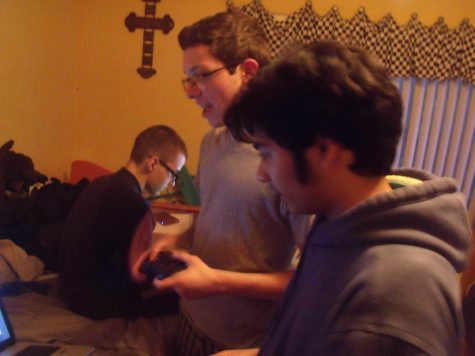Psychology of video games
Video games tap into the human subconscious

photo taken by Brandon Sheffield, Game Developer magazine
An example of a game level designed by Hirokazu Yasuhara. Yasuhara became famous for creating the legendary game icon Sonic the Hedgehog. He also designed the original levels of the game.
Since the 1970s, video games have invaded almost every home and have become popular worldwide. “Video games can be considered as an artistic medium,” says Andrew Abuhanna, a Clark junior who spends most of his time studying video games. “They can also convey a rich story. If you consider movies or television an art form, then you should also consider games as such,” says Abuhanna.

Junior Andrew Abuhanna and his friend Harry Smythe playing Metal Slug 3 . Abuhanna enjoys playing games, especially fighting ones. He says that it helps him “blow off steam.”
But why are games considered such a form of art? What makes video games so much more popular than movies for this young generation? “You read the stories of a character in a book or you watch the character in movies,” says junior Mikia Zohrabian, a gamer of ten years. “However, in a game, you become the character, which vastly changes how the situation in which the character is in is perceived.”
Game designers take that into account when making a game. In the Game Developer magazine’s August issue, Brandon Sheffield interviews Hirokazu Yasuhara, the Namco Bandai Games America senior design director, most famous for creating iconic character, Sonic the Hedgehog. In the interview the thought process behind designing of video games was discussed. As Yasuhara says, “The important thing here is that the player always feels like he’s in control of his own fate, that he’s got a full understanding of the world around him and what’s going on. That has to be a constant process.”
But there is a specific way by which games immerse the player into their virtual world. According to Ernest W. Adams, an author and game designer, games immerse the player through three types of immersion.
First, there is tactical immersion which is experienced when performing an operation that involves skill, such as constantly killing enemies to earn points.
Then there is strategic immersion which is associated with mental challenge. When playing strategy games, the player will experience this form of immersion when the player makes the correct move and achieves victory.

Junior Nicholas Yedigarian engrossed in his favorite video game, League of Legends. The game gets players involved through tactical and strategic immersion. By repeating the process of killing foes again and again all the while coordinating with fellow team players on how to best proceed, the player gets the idea of fighting a real battle.
Finally, there is narrative immersion, which occurs when players get invested in the story. This is similar to the experience achieved while watching a movie or reading a book.
Staffan Björk and Jussi Holopainen, in their book Patterns In Game Design, discuss a fourth type of immersion, spatial immersion. This occurs when a player is given the illusion that the virtual world is “real,” thus making the player believe he or she is physically there.
So a game can physically and mentally involve the player into its world — exploring ancient undiscovered cities, slaying dragons, shooting zombies, and feeling the adrenaline rush caused by the adventure. “I play games because through them I am given the ability to enjoy time with friends while being in the comfort of my home,” says junior Nicolas Yedgarian, a longtime gamer. “They also allow me to take my mind off stress and just have a fun time.”

Jack Thompson speaking at a debate at California University of Pennsylvania. Thomson became famous for his crusade against video game violence. This however earned him a negative publicity and dislike from most video game players.
However, can this immersion also lead to negative consequences? Some say that video games can be dangerous. For every media there are critics, and video games are no exception. Since their birth, some have criticised games for harming a person’s eyes and wasting time. However, these criticisms became more serious when games improved graphically and started depicting more violent scenes. Because of this, serious debates began about whether games encourage violence.
Long time anti-videogame advocate Jack Thompson has led a campaign for a long time against violence in video games. He launched his campaign against the video game industry after the launch of an open-world-sandbox game, Grand Theft Auto 4, which allowed the player to run around beating people senseless. His other victims included games such as Killer 7, Manhunt and Sims 2, all of which allow the player to freely run and kill anything that walks.
However, many, if not all, gamers disagree that video games encourage violence.“I love violent games,” Abuhanna says. “It’s a good way to blow off steam, but any sane gamer recognizes that real life isn’t a game and you can’t go around exhibiting violence towards people for no reason.”

An info-graphic showing different ways video games have acted as therapy for people.
More adult audiences may have a slightly different opinion. Cinematography teacher Matt Stroup said that he has played games and still does, since they “can relieve stress and improve problem solving abilities, however the more violent games may not encourage real violence, they certainly do glorify violence and other criminal acts and desensitize people, which may be even worse.”
Zohrabian, on the other hand, disagrees, saying, “If games desensitize violence, than history books desensitize imperialism. Games can teach teamwork and problem solving. However, games can also teach how to tell a story in a way that no other medium can teach.”

INTERESTS/HOBBIES: Gaming, Reading, movies.
EXTRACURRICULAR ACTIVITIES: KATS, Mock Trial.
THREE WORDS TO DESCRIBE ME ARE: I killed someone.
IN...







